Now 50% Off for a Limited Time
50% Off – Sale Ends Tomorrow
50% Off – Sale Ends Tonight
How to Soothe a Client’s Nervous System After Trauma
Get 50% Off Now!
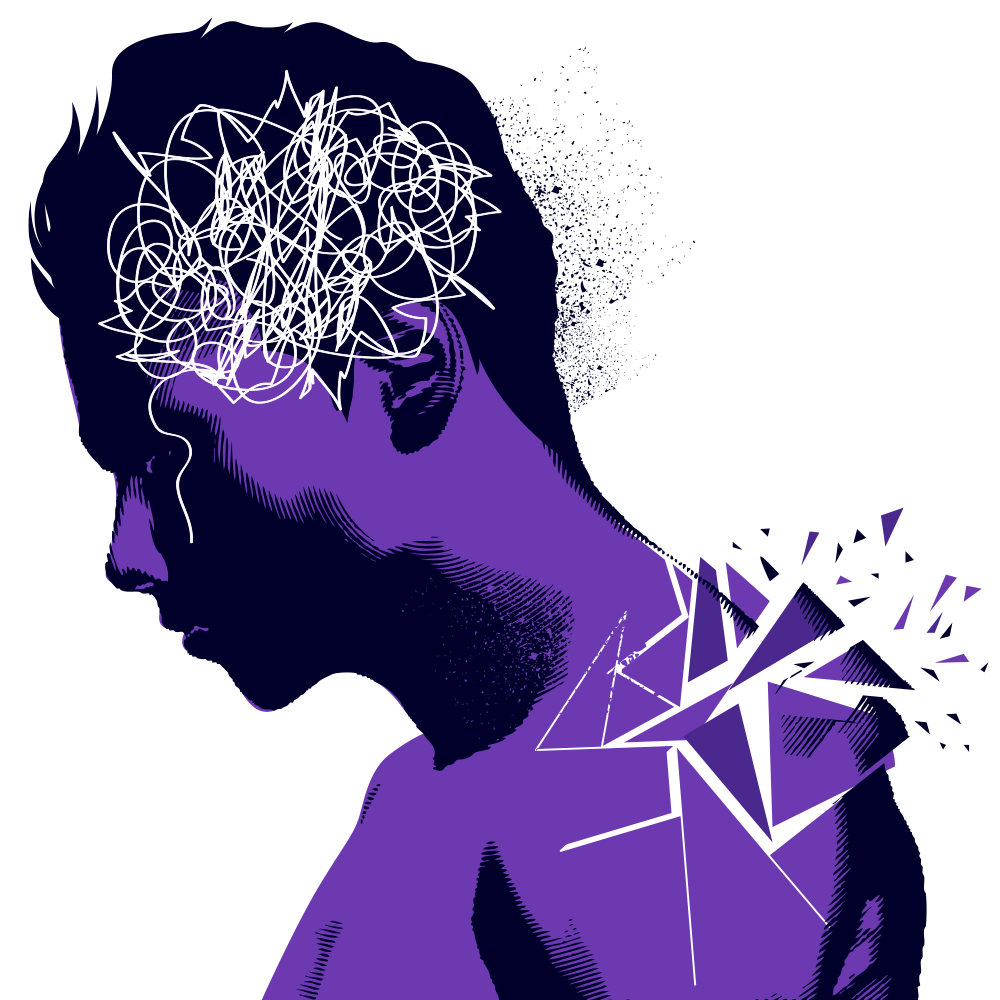
 If you work with trauma, you likely see clients who are dysregulated.
If you work with trauma, you likely see clients who are dysregulated.
That means you know how hard therapy can be when a client is reactive and easily triggered. Not only that, you know how much of a strain that puts on a client’s relationships, their work, and the way they approach the world.
So to help clients widen their window of tolerance more effectively, we need to:
- Understand the neurobiological difference between processing trauma and reliving it
- Downregulate the brain’s alarm systems and restore higher cognitive functioning
- Help clients explore the edges of their window (without triggering them)
That’s why we brought together four masters in the field of trauma (Bessel van der Kolk, MD, Pat Ogden, PhD, Stephen Porges, PhD, Ruth Lanius, MD, PhD) to get their expert insights on working with trauma-related dysregulation.
You’ll get their best strategies for working with the brain, body, and nervous system to help clients ground in the present, increase their window of tolerance, and process trauma.
— New Short Course —
How to Help Clients Come Back from Trauma-Related Dysregulation

How to Help the Traumatized Brain Manage Distress
Bessel van der Kolk, MD Ruth Lanius, MD, PhD
- A Two-Step Process to Help Clients Stay Present and Learn from New Experiences
- Three Strategies That Can Improve the Traumatized Brain’s Capacity to Focus and Engage
- Mindfulness-Based Practices That Can Increase a Client’s Ability to Manage Distress
- One Essential Part of Treatment Clients Often Try to Avoid (and How to Help Them Embrace It)

How to Bring a Client Back from a State of Hypoarousal
Pat Ogden, PhD
- What Happens in the Body During Hypoarousal (and How This Can Impact Your Approach)
- Two Important Factors to Keep in Mind When Working with Hypoarousal
- A Somatic Approach That Can Help Clients Prevent Themselves from Slipping into Hypoarousal
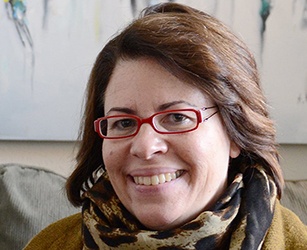
How to Know Whether Your Client’s Dysregulation Is a Symptom of Bipolar Disorder or Trauma
Ruth Lanius, MD, PhD
- One Key Symptom That Can Help You Distinguish Emotional Dysregulation from Bipolar Disorder
- The Critical Difference Between a Manic State and Trauma-Related Anxiety

The Profound Impact of Attachment on a Client’s Ability to Self-Regulate
Pat Ogden, PhD Bessel van der Kolk, MD
- Two Specific Coping Skills That Children with Disorganized Attachment Often Adopt
- The Critical Difference Between Trauma and Disorganized Attachment (and How it Impacts a Client’s Ability to Self-Regulate)
- One Vital First Step in Addressing Dysregulation

Brain-Based Approaches for Bringing Clients Out of Dysregulation
Stephen Porges, PhD Ruth Lanius, MD, PhD Pat Ogden, PhD
- How to Help Clients Calm Their Bodies and Reengage the Thinking Brain
- The Critical Difference in the Brain Between Processing and Reliving Trauma
- How to “Retrain” the Brain’s Alarm System and Restore Higher Cognitive Functioning

Expert Strategies to Help Clients Expand Their Window of Tolerance
Bessel van der Kolk, MD Pat Ogden, PhD Stephen Porges, PhD
- A Polyvagal Approach to Helping Clients Tolerate Dysregulation
- Practical Tools that Can Help Clients Self-Soothe
- The Crucial Role of Presence in Expanding a Client’s Window of Tolerance
- Specific Breathing Exercises That Can Help Calm the Body
Register Here for $197 $97
You’ll get all the videos, audios, transcripts, learning tools, plus 3 bonuses
to help you work more effectively with clients who are dysregulated.
3 CE/CME Credits or Clock Hours are available for purchase at checkout.
Click HERE to get information about CE/CME credits and clock hours as well as speaker disclosures
For This Short Course, We Brought Together Some of the Top Experts in the Field

Bessel van der Kolk, MD
Neuroscientist and Professor of Psychiatry at Boston University Medical School. Author of The Body Keeps the Score: Brain, Mind, and Body in the Healing of Trauma.

Pat Ogden, PhD
Pioneer in Somatic Psychology; Founder and Director of Sensorimotor Psychotherapy Institute (SPI); Co-founder of the Hakomi Institute; Author of Sensorimotor Psychotherapy: Interventions for Trauma and Attachment.

Stephen Porges, PhD
Developer of Polyvagal Theory; Distinguished University Scientist at the Kinsey Institute at Indiana University Bloomington and Research Professor in the Department of Psychiatry at University of North Carolina Chapel Hill.

Ruth Lanius, MD, PhD
Professor of Psychiatry and Director of the Post-traumatic Stress Disorder (PTSD) research unit at the University of Western Ontario. Coauthor of The Impact of Early Life Trauma on Health and Disease: The Hidden Epidemic, and Healing the Traumatized Self: Consciousness, Neuroscience, Treatment.

Kristin Neff, PhD
Professor of Human Development and Culture, Educational Psychology Dept, University of Texas at Austin; Expert in Self Compassion.

Chris Germer, PhD
Co-developer of the Mindful Self-Compassion (MSC) program; Founding faculty member of the Institute for Meditation and Psychotherapy and the Center for Mindfulness and Compassion; Lecturer on psychiatry (part-time) at Harvard Medical School.

Jack Kornfield, PhD
Co-founder of the Insight Meditation Society and Spirit Rock Meditation Center; Author of The Wise Heart and Bringing Home the Dharma: Awakening Right Where You Are.

Kelly McGonigal, PhD
Health psychologist and lecturer at Stanford University; Author of The Upside of Stress: Why Stress Is Good for You and How to Get Good At It and The Willpower Instinct: How Self-Control Works, Why It Matters, and What You Can Do to Get More of It.

Christopher Willard, PsyD
Psychologist and educational consultant specializing in mindfulness; president of the Mindfulness in Education Network; serves on the board of directors at the Institute for Meditation and Psychotherapy.

Susan Pollak, MTS, EdD
Licensed clinical psychologist in private practice; co-founder and teacher at the Center for Mindfulness and Compassion at Harvard Medical School/Cambridge Health Alliance; author of Self-Compassion for Parents: Nurture Your Child by Caring for Yourself.

Kathy Steele, MN, CS
Psychotherapist, consultant and trainer; expert on complex trauma, dissociation, attachment and therapeutic impasse; past president of the International Society for Traumatic Stress Studies; co-author of Treating Trauma-Related Dissociation: A Practical, Integrative Approach.

Ron Siegel, PsyD
Assistant Professor of Psychology, part time, Harvard Medical School; Author of The Mindfulness Solution: Everyday Practices for Everyday Problems and Sitting Together: Essential Skills for Mindfulness-Based Psychotherapy.

Joan Borysenko, PhD
Founder of Mind/Body Health Sciences LLC; Author of New York Times Bestseller Minding the Body, Mending the Mind.

Bill O’Hanlon, LMFT
Co-developer of Solution-Oriented Therapy; Psychotherapist, speaker, and author of Do One Thing Different: Ten Simple Ways to Change Your Life.

Course Director
Ruth Buczynski, PhD
Here's What You'll Get:
Everything is yours to keep forever in your professional library
|
|
Downloadable videos so you can watch at your convenience, on any device |
|
|
Audio recordings you can download and listen to at home, in the car, at the gym or wherever you like |
|
|
TalkBack Segments to distill key ideas (this is where we “land” the session) |
|
|
Next Week in Your Practice sessions to give you concrete strategies to use with patients |
|
|
Professionally-formatted transcripts of the sessions, to make review and action simple |
|
|
Three downloadable bonus videos to help you work more effectively with clients who are dysregulated |
Get 3 Bonuses That Give You Even More Strategies for Helping Clients Come Back from Trauma-Related Dysregulation

How to Help Clients Who Are Stuck in a Trauma Response
Ruth Lanius, MD, PhD
- Three Concrete Steps to Help Clients Move Out of a Trauma Response
- A Practice to Help Clients Shift Out of Numbness and Reconnect with Their Emotions
- Practical Skills to Help Clients Regulate Emotion and Feel Safe in Their Bodies
- How to Help a Client Feel Positive Emotion After Trauma

Essential Practices to Help You Recharge When Working with Trauma
Christopher Germer, PhD Jack Kornfield, PhD Kristin Neff, PhD
Kelly McGonigal,PhD Christopher Willard, PsyD Susan Pollak, MTS, EdD
Geshe Lobsang Tenzin Negi, PhD
- Short, Focused Practices to Help Restore You Between Sessions
- Two Key Questions That Can Help Alleviate Compassion Fatigue
- Expert Techniques That Can Help Your Work with Challenging Clients Go More Smoothly
- One Powerful Practice That Can Change How You Care for Others
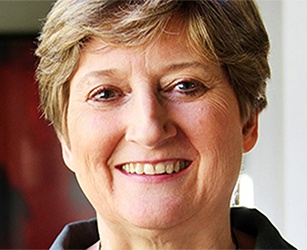
How to Help Patients with Dissociative Identity Disorder Foster Healthier Relationships
Kathy Steele, MN, CS
- Two Primary Ways That DID Can Harm Relationships (and How to Address Each)
- A Critical First Step When Working with DID in Relationships
- How to Help Clients Recognize and Engage with Their Partner’s Dissociative Parts
Register Here for $197 $97
You’ll get all the videos, audios, transcripts, learning tools, plus 3 bonuses
to help you work more effectively with clients who are dysregulated.
3 CE/CME Credits or Clock Hours are available for purchase at checkout.
Click HERE to get information about CE/CME credits and clock hours as well as speaker disclosures
Plus, You’ll Get Practical Tools to Help You Take Action Immediately and Effectively
Synthesize Key Concepts So You Can Use Them Immediately
In the TalkBack Session, Ron Siegel, PsyD and Ruth Lanius, MD, PhD join me to dig more deeply into the key ideas. Our job is to make yours easier by streamlining the information and making sure each point is crystal clear. We’ll clarify critical concepts and break it all down so you can gain confidence in your understanding.
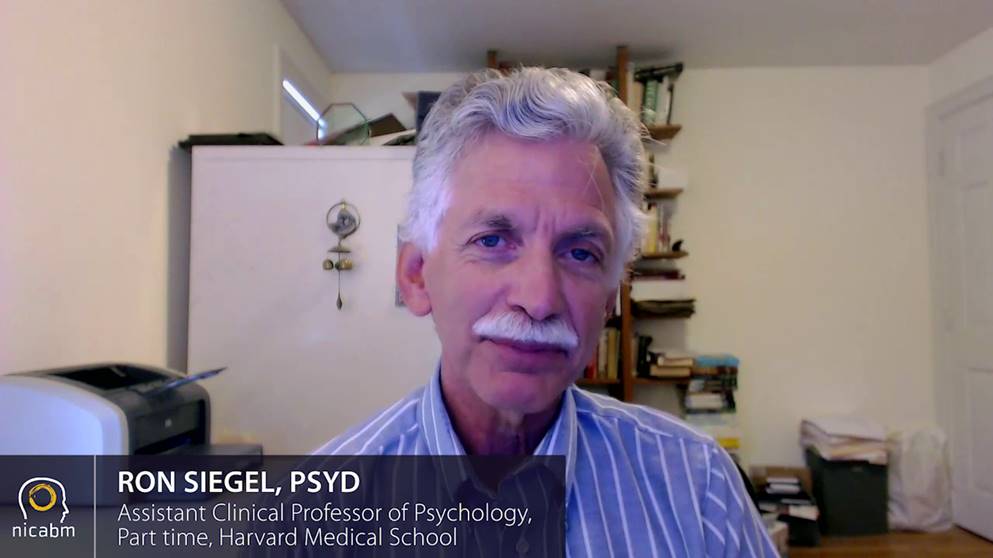
Discover Concrete Practices That Will Work in Your Life (and with Your Patients)
Then, with “next week” in mind, we’ll turn smart ideas into easy-to-use applications for your work. In Next Week in Your Practice, Joan Borysenko, PhD and Bill O’Hanlon, LMFT join me to give you specific practices and exercises based on each session. You’ll get strategies you can use with your clients right away.
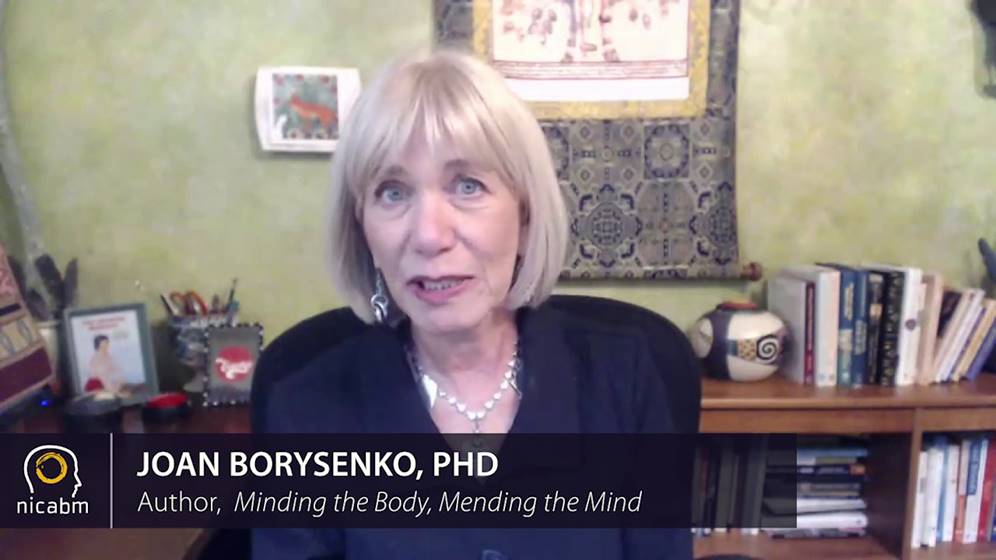
Uncover Core Ideas and Techniques at-a-Glance So You Have a “Cheat Sheet” When You Need It Most
The QuickStart Guide will help you stay fresh and confident as you turn these teachings into action. We’ve gathered all the essential tools and methods from the program into a concise, easy-to-use guide so you can quickly review and apply these ideas when you need them most. It’s an at-a-glance reference to the most powerful concepts and strategies for working with patients who have experienced trauma.
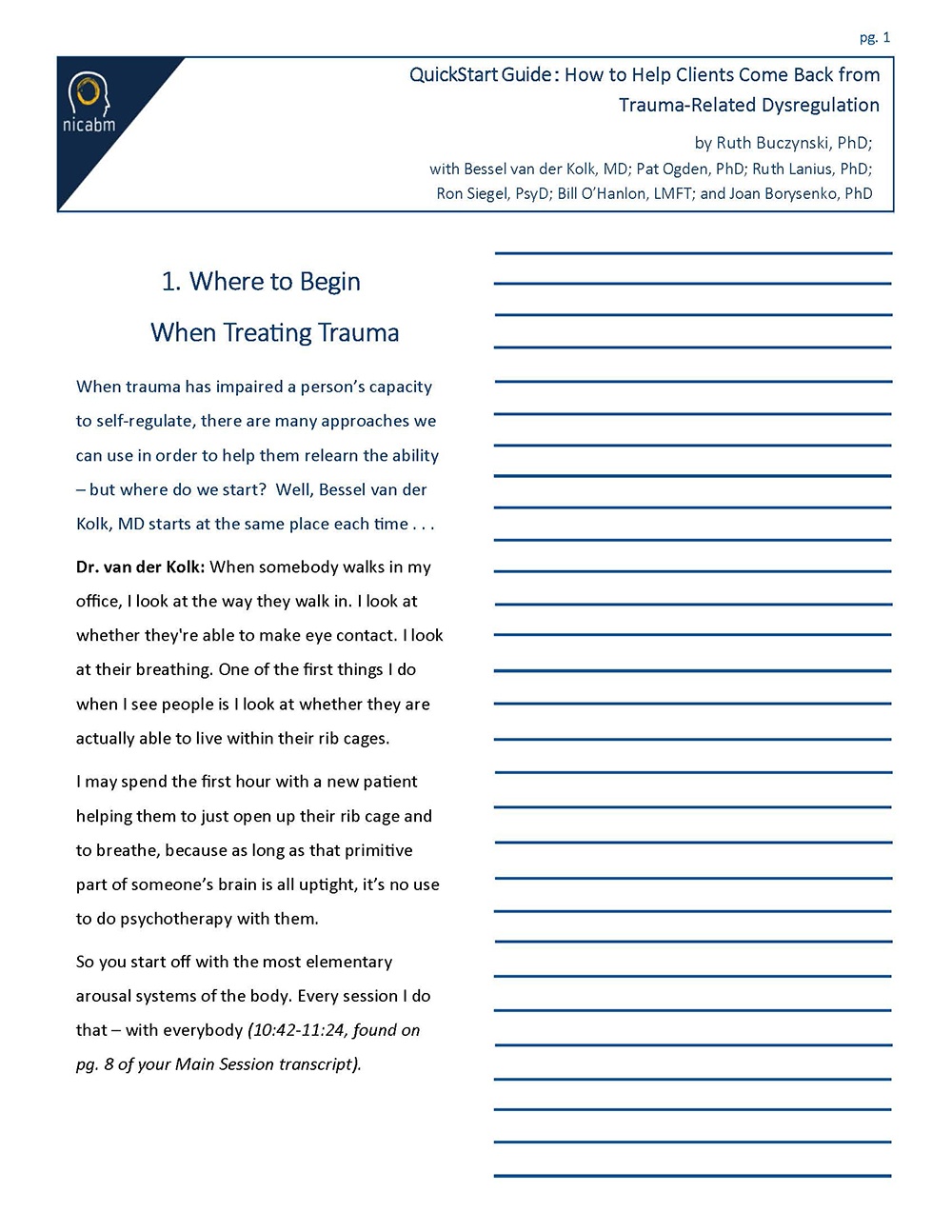
Quickly Recall Crucial Details So You Can Apply Them with Confidence
Our Professional Transcript will help you reinforce key ideas so you can integrate them into your life and work. We’ve designed your transcript with an easy-to-use table of contents, clear, organized formatting, and helpful highlight quotes so you’ll have the information and exercises you need at your fingertips.
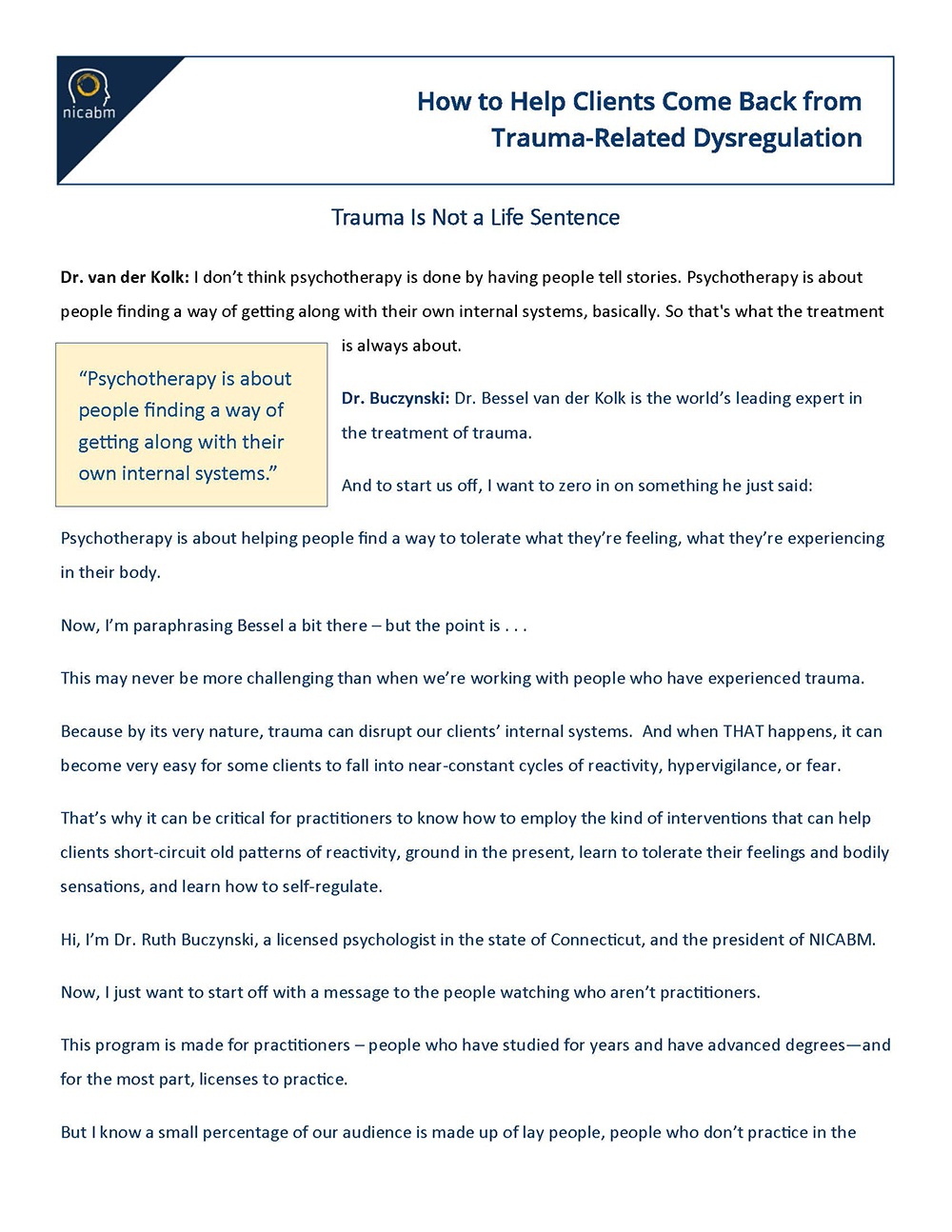
Here's What Your Peers Have Experienced In NICABM Programs

. . . instrumental in opening my mind and heart to understanding trauma.
“These seminars have been instrumental in opening my mind and heart to understanding trauma. They are brief and accessible and of such high quality that I’ve been able to glean real understanding and a starting point for further study. I can’t say enough about them. I have recommended them to so many of my colleagues and they say the same things I do about them. Thank you Ruth!”
Angela Lawrence, Drug and Alcohol Counselor
British Columbia, Canada

The material covered has . . . fully supported my purpose, enhancing my knowledge of the theories behind the actions taken.
“I am a soldier, who works with other soldiers and their families (The PTSD Retreat), in reference to PTSD. We, as soldiers, are all taught the very basics of PTSD, in what we call “death-by-PowerPoint,” but it never goes beyond this. Indeed, it is repeated over and over, without change, and it rarely if ever gets to the families. The material covered in here has fully supported my purpose, enhancing my knowledge of the theories behind the actions taken. I am so grateful to have been able to follow this series and look forward to furthering my education with this entity. Thank you”
D. Nicole Johnson, Drug and Alcohol Counselor
Starr Founder, The PTSD Retreat

. . . very cost effective and practical . . .
“These programs offer a broad spectrum of both information and specific guidelines with top experts in different fields of addressing human suffering. All in a very cost effective and practical way. Rather than thousands of dollars spent on the cost of conference I can learn in the comfort of my own home or office, on my own schedule. Certainly recommend any of these series to my colleagues.”
Ian Macnaughton, PhD, Psychotherapist
Vancouver, BC, Canada

My clients have been able to build their confidence. . .
“My clients have been able to build their confidence in their ability to self-regulate on their own in pretty difficult situations, including work and family of origin situations. Their success has then built their self-esteem as they can see that they can be successful in changing some fairly habitual ways of interacting and hurting themselves. It is a positive cycle that builds upon itself”
Nancy Lasater, MSW, LCSW
Boulder, CO
Why the Transcript Is Essential:
- The transcript makes it easy to go back and double check concepts, citations and names that are mentioned
- We put in a table of contents to make it easy for you to find the exact part of the webinar you need
- Having the concepts already written allows you to take notes on how you’re going to use the ideas rather than transcribing the ideas
- Some people simply learn better by reading than by listening or watching
- You will be able to print out and share techniques presented in the session with your patients

“I really liked being able to follow along with the transcripts as I listened…it was nice not to feel like I had to take notes. I really feel like I remember more when I both hear and see at the same time.”
Mary Ellen McNaughton, Masters in Counseling, Psychology Counselor
Kelowna, British Colombia, Canada
You Are Protected By
NICABM’s Money-Back Guarantee
We invite you to register for this comprehensive training program without any risk. Unless you are completely satisfied, we will refund your money. Just let us know within 30 days from the date of registration. We are that confident that you will find this information to be more than you expected.
Layla from Pike Road, ALJust purchased How to Help Clients Come Back from Trauma-Related Dysregulation4 hours ago
Register Here for $197 $97
You’ll get all the videos, audios, transcripts, learning tools, plus 3 bonuses
to help you work more effectively with clients who are dysregulated.
3 CE/CME Credits or Clock Hours are available for purchase at checkout.
Click HERE to get information about CE/CME credits and clock hours as well as speaker disclosures
